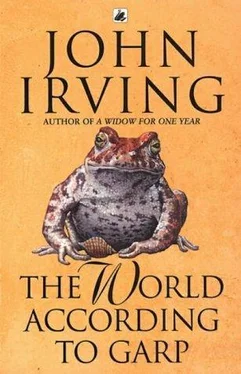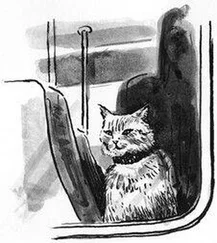By November Jenny had six hundred manuscript pages, but still she had the feeling that she had not really begun. Garp had no subject that could spill out of him in this fashion. Imagination, he realized, came harder than memory.
His “breakthrough,” as he would call it when he wrote Helen, occurred one cold and snowy day in the Museum of the History of the City of Vienna. It was a museum within easy walking distance of the Schwindgasse; somehow he had skipped seeing it, knowing he could walk there any day. Jenny told him about it. It was one of the two or three places she had actually visited herself, only because it was right across the Karlsplatz and well within what she called her neighborhood.
She mentioned there was a writer's room in the museum; she forgot whose. She'd thought having a writer's room in a museum was an interesting idea.
“A writer's room , Mom?” Garp asked.
“Yes, it's a whole room,” Jenny said. “They took all the writer's furniture, and maybe the walls and floor, too. I don't know how they did it.”
“I don't know why they did it,” Garp said. “The whole room is in the museum?”
“Yes, I think it was a bedroom,” Jenny said, “but it was also where the writer actually wrote .”
Garp rolled his eyes. It sounded obscene to him. Would the writer's toothbrush be there? And the chamber pot?
It was a perfectly ordinary room, but the bed looked too small—like a child's bed. The writing table looked small, too. Not the bed or the table of an expansive writer, Garp thought. The wood was dark; everything looked easily breakable; Garp thought his mother had a better room to write in. The writer whose room was enshrined in the Museum of the History of the City of Vienna was named Franz Grillparzer; Garp had never heard of him.
Franz Grillparzer died in 1872; he was an Austrian poet and dramatist, whom very few people outside Austria have ever heard of. He is one of those nineteenth-century writers who did not survive the nineteenth century with any enduring popularity, and Garp would later argue that Grillparzer did not deserve to survive the nineteenth century. Garp was not interested in plays and poems, but he went to the library and read what is considered to be Grillparzer's outstanding prose work: the long short story “The Poor Fiddler.” Perhaps, Garp thought, his three years of Steering German were not enough to allow him to appreciate the story; in German, he hated it. He then found an English translation of the story, in a secondhand bookstore on Habsburgergasse: he still hated it.
Garp thought that Grillparzer's famous story was a ludicrous melodrama: he also thought it was ineptly told and baldly sentimental. It was only vaguely remindful to him of nineteenth-century Russian stories, where often the character is an indecisive procrastinator and a failure in every aspect of practical life: but Dostoevsky, in Garp's opinion, could compel you to be interested in such a wretch; Grillparzer bored you with tearful trivia.
In the same secondhand bookstore Garp bought an English translation of the Meditations of Marcus Aurelius; he had been made to read Marcus Aurelius in a Latin class at Steering but he had never read him in English before. He bought the book because the bookstore owner told Garp that Marcus Aurelius had died in Vienna.
“In the life of a man,” Marcus Aurelius wrote, “his time is but a moment, his being an incessant flux, his sense a dim rushlight, his body a prey of worms, his soul an unquiet eddy, his fortune dark, his fame doubtful. In short, all that is body is as coursing waters, all that is of the soul as dreams and vapors.” Garp somehow thought that Marcus Aurelius must have lived in Vienna when he wrote that.
The subject of Marcus Aurelius's dreary observations was certainly the subject of most serious writing, Garp thought; between Grillparzer and Dostoevsky the difference was not subject matter. The difference, Garp concluded, was intelligence and grace; the difference was art. Somehow this obvious discovery pleased him. Years later, Garp read in a critical introduction to Grillparzer's work that Grillparzer was “sensitive, tortured, fitfully paranoid, often depressed, cranky, and choked with melancholy; in short, a complex and modern man.”
“Maybe so,” Garp wrote. “But he was also an extremely bad writer.”
Garp's conviction that Franz Grillparzer was a “bad” writer seemed to provide the young man with his first real confidence as an artist—even before he had written anything. Perhaps in every writer's life there needs to be that moment when some other writer is attacked as unworthy of the job. Garp's killer instinct in regard to poor Grillparzer was almost a wrestling secret; it was as if Garp had observed an opponent in a match with another wrestler; spotting the weaknesses, Garp knew he could do better. He even forced Jenny to read “The Poor Fiddler.” It was one of the few times he would seek her literary judgment.
“Trash,” Jenny pronounced it. “Simplistic. Maudlin. Cream puff.”
They were both delighted.
“I didn't like his room, really,” Jenny told Garp. “It was just not a writer's room.”
“Well, I don't think that matters, Mom,” Garp said.
“But it was a very cramped room,” Jenny complained. “It was too dark, and it looked very fussy .”
Garp peered into his mother's room. Over her bed and dresser, and taped to her wall mirror—nearly obscuring his mother's own image—were the scattered pages of her incredibly long and messy manuscript. Garp didn't think his mother's room looked very much like a writer's room, either, but he didn't say so.
He wrote Helen a long, cocky letter, quoting Marcus Aurelius and slamming Franz Grillparzer. In Garp's opinion, “Franz Grillparzer died forever in 1872 and like a cheap local wine does not travel very far from Vienna without spoiling.” The letter was a kind of muscle-flexing; perhaps Helen knew that. The letter was calisthenics; Garp made a carbon copy of it and decided he liked it so well that he kept the original and sent Helen the carbon. “I feel a little like a library,” Helen wrote him. “It's as if you intend to use me as your file drawer.”
Was Helen really complaining? Garp was not sensitive enough to Helen's own life to bother to ask her. He merely wrote back that he was “getting ready to write.” He was confident she would like the results. Helen may have felt warned away from him, but she didn't indicate any anxiety. At college she was gobbling courses at nearly triple the average rate. Approaching the end of her first semester, she was about to become a second-semester junior. The self-absorption and ego of a young writer did not frighten Helen Holm, she was moving at her own remarkable pace and she appreciated someone who was determined. Also she liked Garp's writing to her: she had an ego, too, and his letters, she kept telling him, were awfully well written.
In Vienna Jenny and Garp went on a spree of Grillparzer jokes. They began to uncover little signs of the dead Grillparzer all over the city. There was a Grillparzergasse, there was a Kaffeehaus des Grillparzers; and one day in a pastry shop they were amazed to find a sort of layer cake named after him: Grillparzertorte! It was much too sweet. Thus, when Garp cooked for his mother, he asked her if she wanted her egg soft-boiled or Grillparzered. And one day, at the Schцnbrunn Zoo, they observed a particularly gangling antelope, its flanks spindly and beshitted; the antelope stood sadly in its narrow and foul winter quarters. Garp identified it: der Gnu des Grillparzers.
Of her own writing, Jenny one day remarked to Garp that she was guilty of “doing a Grillparzer.” She explained that this meant she had introduced a scene or a character “like an alarm going off.” The scene she had in mind was the scene in the movie house in Boston when the soldier had approached her. “At the movie,” wrote Jenny Fields, “a soldier consumed with lust approached me.”
Читать дальше












